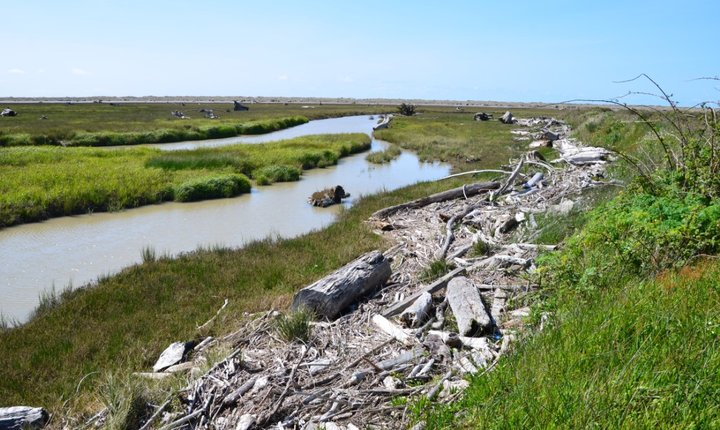
Cannibal Island. Photo: Caltrout.
Press release from Caltrout:
The North Coast regional office of statewide nonprofit conservation organization California Trout (CalTrout) has been awarded a grant of $802,886 to plan restoration of 950 acres of the Eel River estuary at Cannibal Island. The grant, awarded by the California Department of Fish and Wildlife (CDFW) and announced Monday, May 13, is part of $48.5 million awarded to 38 projects statewide for multi-benefit ecosystem restoration and protection projects under Proposition 1 and Proposition 68 grant programs.
The funding allows CalTrout to develop a broad team of agency partners to restore a 950-acre tidal marsh estuary surrounding Cannibal Island, adjacent to the mouth of the Eel River. Throughout the lower Eel River basin, agricultural lands now dominate what historically was forested riparian and wetland habitat. The goal of restoration is to transform the monotypic landscape of diked and drained land back to a mosaic of natural habitats and pasture with reconnected tidal slough channels and access for aquatic-dependent species.
The loss of seasonally freshwater and brackish marsh habitat within the Eel River estuary is an important factor contributing to the decline of coho, Chinook and steelhead abundance. Restoration of the Cannibal Island area will play a prominent role in the recovery of these listed salmonids, as well as Dungeness crab, Tidewater goby, Longfin Smelt, Green Sturgeon, Lamprey and listed native plant and wildlife species found in surveys within the adjacent Salt River and Eel River Estuary Preserve project areas.
The project area includes the 650-acre CDFW Eel River Wildlife Area Cannibal Island Unit, as well as 300 privately-owned acres and is located at the base of the Table Bluff Rancheria, a territory belonging to the Wiyot tribe. Consistent with its mission of solving complex resource issues while balancing the needs of wild fish and people, CalTrout will lead a broad team of stakeholders including landowners, state and federal agency partners, local subcontractors and the Wiyot Tribe.
“This is an exciting project that will allow our team to expand on recent restoration successes in the Eel River delta and estuary, such as the Salt River Ecosystem Restoration Project, and CDFW’s Ocean Ranch Unit,” said Darren Mierau, North Coast Regional Director for CalTrout. “We’re very excited to begin working with GHD and CDFW on this project.”
The grant will fund research into multiple aspects of the landscape. Work will include land and hydrographic surveying, as well as research into soils, endangered species, climate, carbon sequestration, agriculture, archaeology, ethnography and cultural resources.
The project will benefit the local community by employing local contractors and increasing public access to the project area, as well as educational opportunities that increase awareness of, and participation in, recovery actions for salmon and steelhead populations. In the long term, the project implementation will provide benefits to the local economy by restoring aquatic habitat for salmonids, sturgeon, pacific lamprey and Dungeness crab, historically a main sustaining source of income in the region.
This planning phase of intermediate designs projects a completion date of April 2022.
Learn more about CalTrout’s work on the North Coast and throughout the state at caltrout.org.
CLICK TO MANAGE